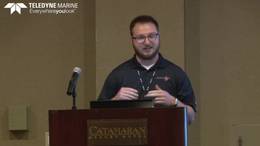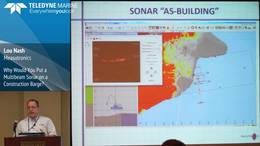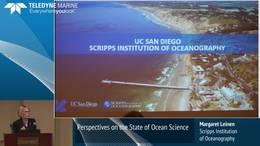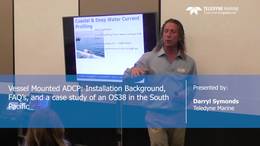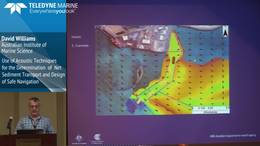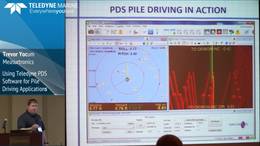The Next Great Odyssey of Human Endeavour Exploring the Deep Ocean
Keynote presentation by Oliver Steeds
Humankind is poised to make the next giant leap – into the deep ocean. We now have the technology available to us to discover more of our planet in the next 10 years than we have in the last 100,000.
Throughout human history, exploration has always driven our progress. Lief Ericson's journey to North America (1001 AD), the discovery of the New World (1490s), Magellan's first circumnavigation (1519) and space exploration (1957-) have all pushed back the frontiers of our knowledge, unlocking immense opportunity and changing our relationship to our planet and ourselves.
But since 1969, we've been looking up when we should have been looking down. The most important part of our planet, the deep ocean, remains the least known part of our planet.
The ocean is the heart of our planet. It's 99% of the planet's biosphere[1], regulates our atmosphere and climate and produces 50% of the oxygen we breath[2]. It captures heat and carbon dioxide which dramatically reduces global warming and provides a primary source of protein for 3 billion people[3]. The ocean is everybody's business. How it changes affects us all. The problem is that we don't know how the deep ocean functions, how healthy it is, how resilient it is and how the development of a sustainable blue economy can drive our growth.
The ocean remains the last great unknown frontier on our planet. We've only biologically sampled 0.0001%[4] and mapped an area equivalent the size of Tasmania to the same kind of detail that we have mapped the entire orbs of the Moon and Mars[5].
From Autonomous Underwater Vehicles (AUVs) to Remotely Operated Vehicles (ROVs), from seabed mapping systems and chemical sensors to the initial library of DNA sequences of marine animals, technological developments now unlock extraordinary new research capabilities. We now have the ability to discover more of our planet in the next 10 years than the last 100,000 of human history.
New areas of economic activity such as renewable energy and marine mining are on the horizon. Millions of new species are to be discovered that can propel human medicine. Resources to be unearthed that will drive our sustainable economic development. Even the origins of life on Planet Earth are to be found.
To engage the world in our all of our work, we should be looking to the space community to learn how to improve our story-telling – engaging our audiences with stories that are positive, forward looking and about a brighter future; that are Mission based and trigger the imagination, communicating danger and building on narratives of exceptionalism, patriotism, exploration and the collective human achievement.
Together, as an industry, we are already leading the exploration of the deep ocean, the last, great unknown frontier on Planet Earth.
The Apollo Missions, polar exploration, Jacques Cousteau's adventures, even Felix Baumgartner's space jump captivated the world with their human drama, battles against adversity, and above all, the unknown. We need the unknown. It is the sense of mystery that gives us imagination and makes us human. Our work is the next positive epic story of human endeavor that can inspire humanity.
SOURCES:
[1] http://www.un.org/sustainabledevelopment/oceans/
[2] http://earthsky.org/earth/how-much-do-oceans-add-to-worlds-oxygen
[3] http://www.worldwildlife.org/industries/sustainable-seafood
[4] www.marineboard.eu/file/265/download?token=J5hokhHB
[5] http://www.motherearthnews.com/nature-and-environment/nature/fun-surprising-facts-about-the-oceans.a...
[6] http://www.earthsurfaceprocesses.com/3c-E-MassExtn.html
Humankind is poised to make the next giant leap – into the deep ocean. We now have the technology available to us to discover more of our planet in the next 10 years than we have in the last 100,000.
Throughout human history, exploration has always driven our progress. Lief Ericson's journey to North America (1001 AD), the discovery of the New World (1490s), Magellan's first circumnavigation (1519) and space exploration (1957-) have all pushed back the frontiers of our knowledge, unlocking immense opportunity and changing our relationship to our planet and ourselves.
But since 1969, we've been looking up when we should have been looking down. The most important part of our planet, the deep ocean, remains the least known part of our planet.
The ocean is the heart of our planet. It's 99% of the planet's biosphere[1], regulates our atmosphere and climate and produces 50% of the oxygen we breath[2]. It captures heat and carbon dioxide which dramatically reduces global warming and provides a primary source of protein for 3 billion people[3]. The ocean is everybody's business. How it changes affects us all. The problem is that we don't know how the deep ocean functions, how healthy it is, how resilient it is and how the development of a sustainable blue economy can drive our growth.
The ocean remains the last great unknown frontier on our planet. We've only biologically sampled 0.0001%[4] and mapped an area equivalent the size of Tasmania to the same kind of detail that we have mapped the entire orbs of the Moon and Mars[5].
From Autonomous Underwater Vehicles (AUVs) to Remotely Operated Vehicles (ROVs), from seabed mapping systems and chemical sensors to the initial library of DNA sequences of marine animals, technological developments now unlock extraordinary new research capabilities. We now have the ability to discover more of our planet in the next 10 years than the last 100,000 of human history.
New areas of economic activity such as renewable energy and marine mining are on the horizon. Millions of new species are to be discovered that can propel human medicine. Resources to be unearthed that will drive our sustainable economic development. Even the origins of life on Planet Earth are to be found.
To engage the world in our all of our work, we should be looking to the space community to learn how to improve our story-telling – engaging our audiences with stories that are positive, forward looking and about a brighter future; that are Mission based and trigger the imagination, communicating danger and building on narratives of exceptionalism, patriotism, exploration and the collective human achievement.
Together, as an industry, we are already leading the exploration of the deep ocean, the last, great unknown frontier on Planet Earth.
The Apollo Missions, polar exploration, Jacques Cousteau's adventures, even Felix Baumgartner's space jump captivated the world with their human drama, battles against adversity, and above all, the unknown. We need the unknown. It is the sense of mystery that gives us imagination and makes us human. Our work is the next positive epic story of human endeavor that can inspire humanity.
SOURCES:
[1] http://www.un.org/sustainabledevelopment/oceans/
[2] http://earthsky.org/earth/how-much-do-oceans-add-to-worlds-oxygen
[3] http://www.worldwildlife.org/industries/sustainable-seafood
[4] www.marineboard.eu/file/265/download?token=J5hokhHB
[5] http://www.motherearthnews.com/nature-and-environment/nature/fun-surprising-facts-about-the-oceans.a...
[6] http://www.earthsurfaceprocesses.com/3c-E-MassExtn.html

